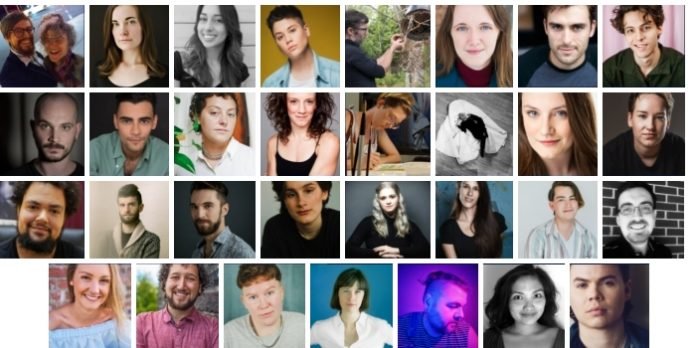Following on the heels of its Micro Digitals project from last spring, Dartmouth-based Eastern Front Theatre (EFT) takes a broader view this year with Macro Digitals: Connections, a series of theatrical installations that can be experienced both in-person at Alderney Landing or online.
It’s a chance to come with your friends to experience some interactive art and see what people here are making that is pushing the boundaries of what theatre and art can be. – Kat McCormack
Where last year’s Micro Digitals saw twenty artists create sub-sixty second digital-only creations, this year, a team of thirty Atlantic Canadian artists worked on seven interactive installations of varying lengths.
Each performance is designed for audiences to actively interact with them as they happen, with an online component allowing viewers worldwide to click through via the internet.
“It’s about giving Atlantic Canadian theatre artists a chance to come together, work together, do some skill-sharing and create some experimental, exploratory creations,” says EFT artistic director Kat McCormack.
The combination of in-person and online continues what McCormack calls the “digital Renaissance” of theatre brought on by the pandemic.
“Connections came from this idea of how have we have been connecting with each other throughout this pandemic, and what do you gain or lose when you add the digital,” she says.
While some of the projects will provide those online with an opportunity to engage with people in the space, McCormack says in some cases, it will be a bit more voyeuristic.
“They might just be watching what’s happening, or in some cases, people on the internet will be able to affect the art that is happening in the space for the people that are viewing it in person,” she says.
Small socially-distanced groups will move between installations, happening simultaneously in a loop at the Alderney Landing Theatre. “So you can spend as much time as you want at each project,” says McCormack.
A yet-to-be-titled song cycle from Halifax interdisciplinary artist Riley Reign is among the projects.
“Riley is an artist with bipolar disorder, and their gorgeous song cycle takes you through the process of a bipolar episode,” says McCormack. “It is quite a visual and auditory feast.”
In The Assembly from lead artists Deivan Steele and Breanne Tice, theatre meets board game as audiences form a team trying to guide their community to the year 2300.
“The two artists have created a larger-than-life board game where at each round more years go by, and previous decisions affect the game going forward,” explains McCormack.
Wayne Burns’s Run explores themes of existentialism, queerness and isolation in a multimedia installation using textile and video. At the same time, Jacinte Armstrong’s three-stage performance piece uses the participation of audience members in the creation of their piece.
In Patrick Jeffrey’s Soft Interrogation, an audience member and interrogator develop a relationship through a series of questions asked by a voice in the dark.
With Zeno Box, artistic lead Jean-Michel Cliche explores the uncertainty of theatre during the pandemic and the philosophical questions around the value of rehearsing and creating plays that ultimately get cancelled and never seen. “The goal is to allow the audience to experience the euphoria we feel as theatre artists when we are able to be in front of others and the futility of creating performance art that will never be seen.”
In the final project, Everette Fournier takes the lead in exploring dissociation and purgatory in The Unbetween. “This piece is a reflection of the dissociation that can so easily overwhelm us as we navigate a world that is fraught with conflict and constant change.”
In its ongoing mandate for inclusion and accessibility, EFT has also brought accessibility coordinator Sarah Graham on board to work with the different teams to ensure everyone gets the same experience.
“Accessibility and art are the beginning steps to a more innovative world,” says Graham. “To have artists thinking about and creating accessible projects from the beginning is creating new art to be accessible instead of trying to ‘fit’ accessibility into already inaccessible projects.”
Likening Macro Digitals: Connections to the work of Halifax’s Nocture art festival, McCormack says it is an opportunity to have an experience unlike anything else right now.
“It’s a chance to come with your friends to experience some interactive art and see what people here are making that pushes the boundaries of what theatre and art can be,” she says.
Macro Digitals: Connections runs at the Alderney Landing Theatre and online from March 25 through March 27. Visit easternfronttheatre.com for tickets and information.


